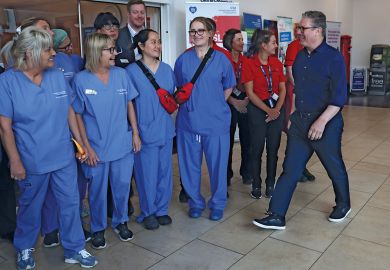John Parkinson, a senior lecturer in the education department at the University of Wales, opens his book with a quote from Lawrence Stenhouse: "Teaching is not to be regarded as a static accomplishment like riding a bicycle..." He then provides us with an important resource to help move secondary science teaching forward.
The first two of the book's 12 chapters consider the whole school improvement cycle, the distinction between leadership and management, and between team building and time management (but with no magic solutions, I'm afraid). Other chapters focus on continuity and progression, assessment, the nature of science, practical work, information and communications technology, written and oral work, promoting pupils' learning and differentiation.
The most important chapter in the book is "Self-improvement". It encourages a reflective approach to teaching and considers the "teacher as learner". In describing action research, Parkinson tells how Alan Irwin, a teacher in Northumberland, taught two parallel groups of 14-year-olds the concept of the atom and the periodic arrangement of the elements. One group considered the historical development of ideas, from the Greeks to the present day; the other did not.
Disappointingly, a test showed no difference in the understanding of the contemporary science, but Irwin reported benefits in terms of more discussion among the pupils. As Parkinson concludes: "Not everything can be measured by written tests."
Most chapters are interspersed with "Things to consider". These encourage the reader to reflect on, say, "the system of target setting used in the science department". Within the developing climate of school and department self-evaluation, these items provide a very useful focus for department discussion, self-review and research. There are also many useful tables such as the one that summarises "questioning technique".
The book has some imperfections. On a few occasions, acronyms are introduced but not defined until subsequent chapters. The teacher who wants to find out about the Key Stage 3 strategy may be confused by reference to "special advisory teachers" as well as "science consultants".
And for a book published in 2004 some sections are dated. When considering the dip in pupils' progress during KS3, it is claimed that "we are only now coming to realise that something needs to be done about it". The KS3 strategy was introduced four years ago to address this. A few readers will note the omission of the Evidence-informed Practice in Science Education (EPSE) and "Testbase: Assessment for learning" projects.
In his final chapter, "Where do we go from here?", Parkinson presents his view of life before and with the national curriculum. He briefly considers scientific literacy and citizenship and asks what a future science curriculum should contain. But he does not answer his question, opting only to cite the ten recommendations of the Nuffield Foundation's Beyond 2000 report. He then summarises the AS-level science for public understanding and the science for the 21st century pilot GCSE.
Finally, Parkinson concludes: "Will we get it right next time? The answer is yes, possibly, but success is only likely to be achieved if teachers make their views known and if curriculum designers listen." I would like to have read his thoughts on where we go from here.
Parkinson provides an invaluable resource for all those involved in science education. The book's strength lies in its synthesis of a wide range of secondary sources, with each chapter providing an extensive list of references. There is something for everyone - student teachers, qualified teachers, heads of department, researchers, advisers and trainers.
Damian Ainscough is science consultant for Blackpool Local Education Authority.
Improving Secondary Science Teaching
Author - John Parkinson
Publisher - Routledge Falmer
Pages - 280
Price - £75.00 and £19.99
ISBN - 0 415 25045 5 and 25046 3
Register to continue
Why register?
- Registration is free and only takes a moment
- Once registered, you can read 3 articles a month
- Sign up for our newsletter
Subscribe
Or subscribe for unlimited access to:
- Unlimited access to news, views, insights & reviews
- Digital editions
- Digital access to THE’s university and college rankings analysis
Already registered or a current subscriber?



